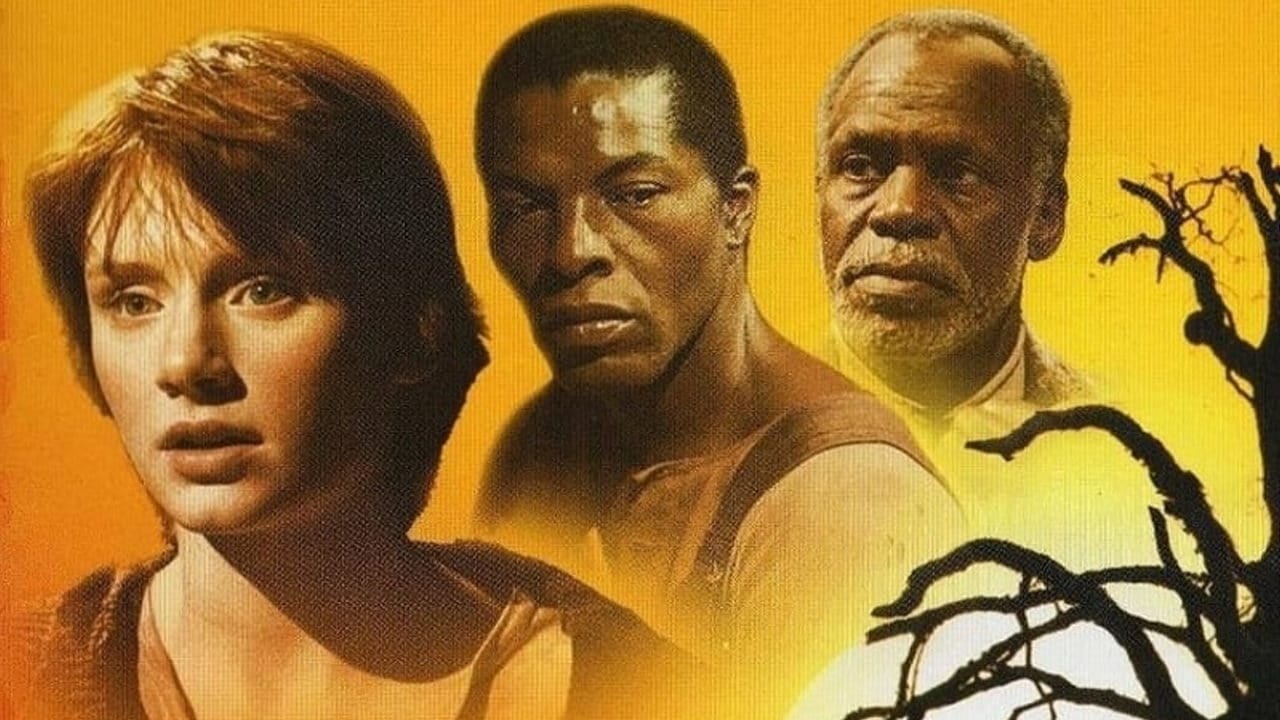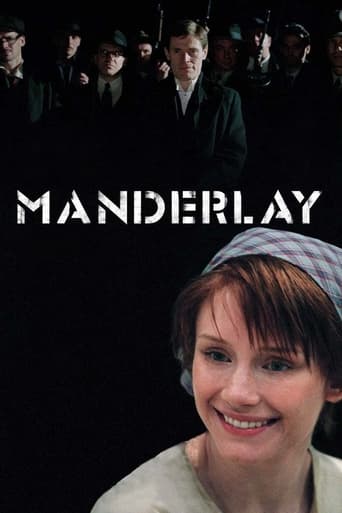

I just finished viewing this movie (Manderlay) and am still trying to catch my breath. As an African American woman who is 60+, I have history on the race relations in America. Raised in Washington DC during the 60s, I was at the March on Washington. In school, I questioned the validity of Black folks and their contribution to this country. I was amazed when finally reading about the contributions of Africans not only to this country but the world. As an actor in theater and film, I found this movie flawless and knew after 10 minutes that someone outside of the USA wrote the script. I loved this film, found it by accident, and will research to determine if it was ever shown in this town. Beautiful piece of work but I agree that for most Americans, it will not set with them easily. I would make it required viewing for high school and college students. Well done
... View MoreI am writing this review only for one reason: to explain the dumb people who view this film as racist, that it is nothing they think.I will make it short- this is what the movie was trying to say (and it is not the directors fault you did not get it): White people caused slavery. After a while (a long, long while) it started to be perceived as something bad and was abolished. Of course people who were living in slavery (meaning- outside the society) didn't know how to find their way and survive outside the concept of slavery, of course they couldn't be as successful as a white person- they didn't have the same chances. So, the white people try to "help" for a short while, and of course the problems which took generations to build up cant be solved in a short time. Then the whites get angry, they are sick of helping, they feel burdened by the blacks and their inability to make it in the society. And they punish the blacks because the blacks couldn't make it, but they are forgetting: the blacks didn't cause the problem, the whites did.Its not only about black and white, it is about human nature and racism is just one example.So, please, this movie is no way racist, it is the complete opposite.
... View More"Hey, we've decided to basically do Dogville again, with the same kind of staging and storyline." "Cool, I loved Dogville." "And it's going to be about a slave plantation and be a critique of white liberal paternalism.""Sweet.""Except we can't get Nicole Kidman again so we'll have Bryce Dallas Howard playing the main character instead.""Well, that's a... pretty significant downgrade, but I guess it's not fatal." "As the movie goes along we'll have her become a part of the community as they struggle through their first year of independence, dealing with lots of challenges. And they'll be all these times when she jumps to conclusions about something that seems evil and then later it seems necessary." "That sounds like it could be pretty powerful, if a bit didactic." "So in the end the natural conclusion is that she finds out that the slavery was actually beneficial for all of the blacks and actually instituted by them to keep everyone in a place that made them happy.""...wait, what?" "And the proud African caricature who's been in the film for the last two hours will turn out to be a drinking, gambling, lying 'pleasin' n*****' who needs to be whipped for his own good!" "You know, this film is starting to sound pretty racist." "We can't be racist! We're Europeans critiquing America!" "Yeah, whatever. Well, you almost had me there."
... View MoreManderlay is the second installment of Lars Von Trier's thought-provoking trilogy USA - Land of Opportunities. The story, told in eight episodes, starts where Dogville ended. Grace, her father, and their bunch of gangsters stop to eat by a place in Alabama called Manderlay Plantation, where slavery persists 70 years after its Abolition. Idealistic Grace decides to stay, free the blacks and start a communal free plantation.The setting, like in Dogville, is a theatrical set with minimalist elements of architecture and floor drawings marking the different areas of the place. The camera wanders both very close to the characters, as if the viewer was filming them with their own video-camera, but also from above, from bird's view, as if all they were little pieces in a chess table or little dolls. The setting serves the viewer to focus on the story and its message.Trier is always merciless depicting the human being and Society, not because he is nasty or weird, but because it an artist' obligation -or it should be, because that's the matter of Art- to reflect on the issues that affect the world we live in. You like it or not, Trier is a true artist. In fact, Manderlay's story, is indeed relevant to contemporary Western society.Three main questions are explored and answered in Manderlay and explicitly posed to the viewer through the events told in the movie: 1/ Is democracy the best political system to have a free society? 2/ Can democracy be preached by using the support of guns? 3/ What is the best solution to the race problem in America, both in the past and in the present? Thus, Grace teaches the blacks the rudiments of democracy, but does so as she is escorted and supported by a bunch of gangsters, therefore, from a position of power and of white superior - the same she believes she's fighting against. Moreover, nobody has elected her, so she shouldn't be preaching democracy. If this wasn't enough, Grace tries -always with the best intention, to teach blacks people how to be black and be free without even asking them what they want, she who is not black and has never been a Slave. Actually, she was a sort of slave in Dogville, but she did not learn from that. The shock that she gets at the end of the movie masterly reflects how a just system can be unjust and oppressive when imposed on people who don't benefit from it and have had no voice in its establishment.There is not blinder/deaf person that the one who doesn't want to see/hear. The little moral of the story is mentioned at the beginning, when Grace's father reminds her of her childhood and the bird she had in a cage, which she freed thinking that it was the best thing for it, but not being a wild bird, she found it frozen in the window next day. And, once again, she would treat the blacks with affection and love, but also as if she was her owner.The actors are all good in their respective roles. Bryce Dallas Howard is good as Grace Margaret Mulligan; she looks very sweet and innocent, which helps to convey the naivety and paternalism of her character; however, I found her a little bland sometimes, To be honest, I would have liked seeing Nicole Kidman, as she still looks fragile and naive, but she has a maturity that would have given an extra push to the character; however, I don't think that frigid Nicky would have been good enough in the sex scene. Also very convincing are Isaach De Bankolé as the proud and feisty Timothy, Danny Glover as Wise Elder Wilhelm, and Mona Hammond as lovely but week Old Wilma. However, all the cast is terrific.The music is terrific as well as the last song by David Bowie, Young Americans, which is really relevant to the story, as well as the photos of the America that would have waited for the Manderlay blacks until well entered the 1970s.The main flaws of the film are that the story can be easily twisted if interpreted literally to say that the movie supports slavery or that puts the blame on the blacks for not freeing themselves earlier, which is completely the opposite of what the films intends. The movie, moreover, is not engaging enough at the beginning and a little bit of footage could have been cut. Finally, the colors and quality of the film used are very poor, which really makes the watching not as enjoyable as it could have been. Trier was much more careful in Dogville and had better colors, lightening and a sharper contrast.A very good film, not always engaging.
... View More